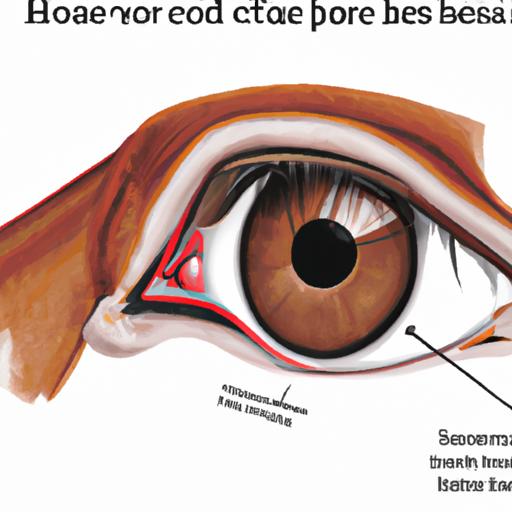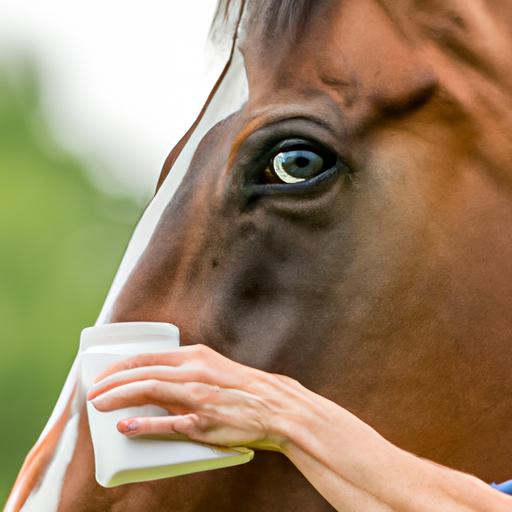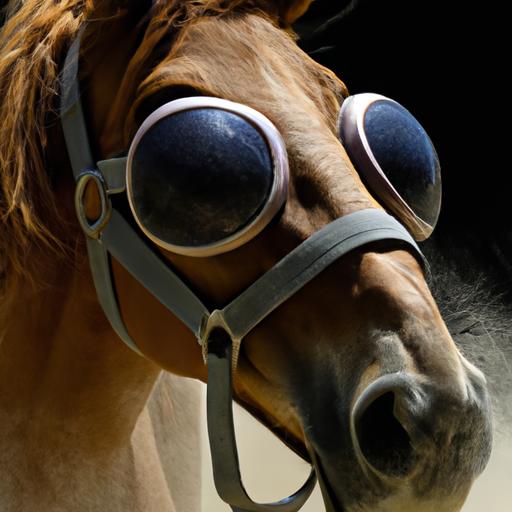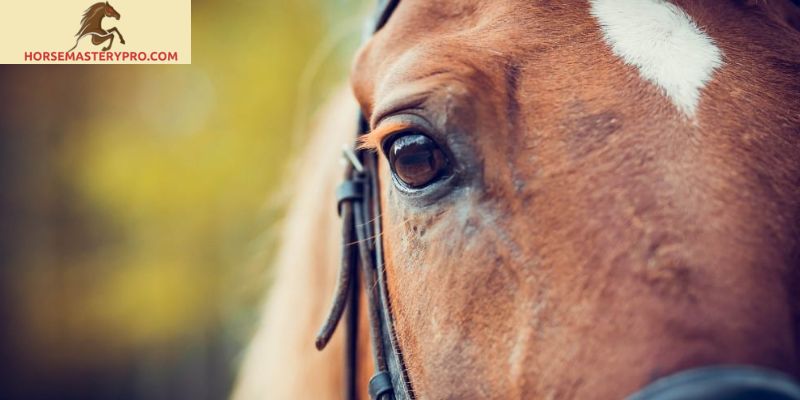As horse owners, we strive to provide the best care for our beloved equine companions. From their majestic manes to their strong limbs, every aspect of their well-being deserves our utmost attention. However, one area that is often overlooked is their eyes. Proper horse eye care is crucial for maintaining their overall health and ensuring they have optimal vision. In this article, we will explore the importance of horse eye care and delve into the fascinating anatomy of a horse’s eye.
Understanding the Anatomy of a Horse’s Eye
Before we can fully comprehend the significance of horse eye care, let’s take a moment to admire the intricacies of their remarkable visual organ. A horse’s eye is a marvel of nature, designed to provide them with keen eyesight and the ability to perceive even the slightest movement. With a large, spherical shape and a captivating range of colors, their eyes are truly captivating.
As prey animals, horses heavily rely on their vision to detect potential dangers and navigate their surroundings. Each eye is equipped with a remarkable structure called the cornea, which acts as a protective layer against debris and harmful UV rays. Additionally, their eyes possess a lens that focuses incoming light onto the retina, a layer of light-sensitive cells responsible for capturing visual information. The retina then sends signals to the brain, allowing horses to interpret the world around them.
Now that we have a basic understanding of the horse’s eye anatomy, let’s explore why proper horse eye care is of utmost importance. By diligently attending to their eye health, we can ensure our equine friends enjoy a lifetime of clear vision and maintain their overall well-being. Join me as we embark on a journey to discover the various facets of horse eye care and learn essential tips for maintaining healthy eyes for our noble companions.
Stay tuned for the upcoming sections, where we will delve into common eye problems in horses, proper cleaning and maintenance techniques, nutritional factors for healthy eyes, environmental protection, and the significance of regular veterinary check-ups and eye examinations. Together, let’s take proactive steps towards ensuring our horses’ eyesight remains as sharp and vibrant as their spirit.
**
Common Eye Problems in Horses

Identifying and Preventing Common Eye Conditions
As responsible horse owners, it is essential to be vigilant when it comes to identifying and preventing common eye conditions in our equine companions. By recognizing the early signs and taking proactive measures, we can help alleviate discomfort and prevent potential complications. Here are some prevalent eye problems that horses may encounter:
1. Conjunctivitis
Conjunctivitis, also known as “pink eye,” is a common eye condition in horses. It occurs when the conjunctiva, the thin membrane covering the front of the eye, becomes inflamed. This can be caused by bacteria, viruses, irritants, or allergens. Keep an eye out for symptoms such as redness, excessive tearing, discharge, and sensitivity to light. Prompt veterinary attention is crucial to prevent the spread of infection and provide appropriate treatment.
2. Corneal Ulcers
Corneal ulcers, which are open sores on the cornea, can result from trauma, foreign objects, or bacterial or fungal infections. Horses may exhibit symptoms like squinting, excessive tearing, cloudiness, or a visible white spot on the cornea. Timely intervention is vital, as untreated corneal ulcers can lead to severe complications or even vision loss.
3. Uveitis
Uveitis, also known as equine recurrent uveitis or moon blindness, is a recurring inflammatory condition affecting the uvea, the middle layer of the eye. This condition can cause redness, squinting, tearing, and light sensitivity. Uveitis can be triggered by various factors, including infections, immune system disorders, or trauma. Early detection and management are crucial to prevent further damage to the eye.
Common Symptoms and Signs of Eye Issues in Horses
To ensure timely intervention, it is important to be aware of the common symptoms and signs of eye issues in horses. Watch out for the following indicators, as they may signal potential problems with your horse’s eyes:
- Excessive tearing or discharge
- Redness or inflammation
- Cloudiness or opacity in the eye
- Squinting or excessive blinking
- Sensitivity to light
- Rubbing or pawing at the eye
- Changes in behavior or temperament
Remember, prevention is key. Regularly inspect your horse’s eyes, especially after activities that may expose them to potential hazards. If you notice any abnormalities or suspect an eye problem, consult with a qualified equine veterinarian immediately. By being proactive in identifying and preventing common eye conditions, we can safeguard our horses’ vision and overall well-being.
**
Proper Cleaning and Maintenance of Horse’s Eyes

As responsible horse owners, it is our duty to ensure the cleanliness and well-being of our equine companions’ eyes. Regular cleaning and maintenance not only help prevent infections but also contribute to their overall ocular health. In this section, I will guide you through a step-by-step process to safely clean your horse’s eyes and provide recommendations for effective eye cleaning products.
Step-by-step Guide to Safely Clean a Horse’s Eyes
- Prepare for the Cleaning Process: Begin by gathering all necessary supplies, including a clean, soft cloth or sponge, warm water, and a vet-approved eye cleaning solution. Make sure your horse is comfortable and secure before proceeding.
- Approach with Care: Approach your horse calmly and gently. Speak softly to reassure them and gain their trust. Remember, a relaxed horse will be more cooperative during the cleaning process.
- Inspect for Any Discharge or Debris: Carefully examine your horse’s eyes for any signs of discharge, dirt, or foreign objects. If you notice any abnormalities, it is advisable to consult with a veterinarian before attempting to clean them.
- Dampen the Cloth or Sponge: Moisten the cloth or sponge with warm water or the recommended eye cleaning solution. Ensure it is not dripping wet, as excess moisture may cause discomfort to your horse.
- Clean the Eyes: Start by gently wiping the corners of your horse’s eyes, moving inwards towards the center. Use a soft, circular motion to remove any dirt or debris. Be cautious not to apply excessive pressure or rub vigorously, as this may cause irritation.
- Repeat on the Other Eye: Once you have cleaned one eye thoroughly, repeat the process on the other eye, using a fresh section of the cloth or sponge.
- Observe for Any Changes: After cleaning, observe your horse’s eyes for any signs of redness, swelling, or unusual behavior. If you notice any concerning symptoms, consult with a veterinarian promptly.
Recommended Products for Eye Cleaning and Maintenance
When it comes to choosing the right products for cleaning and maintaining your horse’s eyes, it is vital to opt for vet-approved solutions and gentle materials. Here are a few recommended products to consider:
- Sterile Eye Wash: Look for a sterile eye wash solution specifically formulated for horses. These solutions are designed to effectively cleanse the eyes while being gentle and non-irritating.
- Soft, Lint-free Cloths: Choose soft, lint-free cloths or sponges to avoid any potential irritation or scratching of the delicate eye surface. Microfiber or cotton cloths are excellent options.
- Eye Cleaning Pads: Eye cleaning pads offer convenience and ease of use. They are pre-moistened with gentle, soothing solutions that aid in removing debris and maintaining eye hygiene.
Remember, before using any new product on your horse’s eyes, consult with your veterinarian to ensure it is suitable for your horse’s specific needs.
By following these cleaning and maintenance practices and utilizing appropriate products, you can help promote healthy eyes for your beloved equine companion.
**
Environmental Factors and Eye Protection for Horses

As we continue our exploration of horse eye care, it is essential to address the environmental factors that can pose risks to our equine companions’ visual health. Horses spend a significant amount of time outdoors, exposed to various elements that can irritate or harm their eyes. In this section, we will discuss the importance of protecting horses’ eyes from dust, pollen, and other irritants, along with recommended eye protection gear and practices.
Protecting Horses’ Eyes from Dust, Pollen, and Other Irritants
The great outdoors offers a wealth of beauty and adventure for our horses, but it also presents potential hazards. Dust, pollen, insects, and foreign objects can all find their way into a horse’s eyes, causing discomfort, irritation, and even more severe problems if left unaddressed. It is crucial for us, as responsible horse owners, to take proactive measures to protect their delicate eyes.
One of the best ways to shield your horse’s eyes from irritants is by utilizing fly masks. These specially designed masks cover the horse’s head, including their eyes, providing a physical barrier against dust, pollen, and flying insects. Fly masks are available in various sizes and styles, allowing you to choose the one that best fits your horse’s needs and preferences. By incorporating a fly mask into your horse’s daily routine, you can significantly reduce the risk of eye irritation and potential injuries.
Another important aspect of environmental eye protection is maintaining clean and hygienic stabling and pasture environments. Regularly removing manure and dampening the areas can help minimize dust, which can exacerbate eye irritation. Providing a well-ventilated space for your horse to rest and minimizing exposure to dusty or pollen-rich environments can also contribute to their eye health.
Recommended Eye Protection Gear and Practices
In addition to fly masks, there are other eye protection gear and practices you can incorporate into your horse’s routine. If your horse is involved in activities such as jumping or trail riding, consider using protective goggles specifically designed for equine use. These goggles provide additional coverage and safeguard against debris, without compromising the horse’s visibility or comfort.
When grooming your horse, be mindful of the products you use around their eyes. Opt for gentle, eye-safe cleansers and avoid using any harsh chemicals that could cause irritation or damage. Take care when applying fly repellents or any other topical treatments near the eye area, ensuring they are specifically formulated for equine use and applied according to the manufacturer’s instructions.
By taking proactive steps to protect our horses’ eyes from environmental irritants, we can help them enjoy a clearer, more comfortable vision. Remember, prevention is key when it comes to eye care, and a little extra effort can go a long way in ensuring the well-being of our equine companions.
**
Conclusion: Prioritizing Horse Eye Care for a Brighter Future
As we come to the end of our exploration into the world of horse eye care, it is evident that the well-being of our equine companions is deeply intertwined with the health of their eyes. By understanding the importance of horse eye care and taking proactive measures to ensure their vision remains clear and unimpeded, we can enhance their quality of life and forge a deeper bond with these magnificent creatures.
Remember, as horse owners, we have a responsibility to prioritize their eye health. Regular eye examinations by qualified equine veterinarians are essential to catch any potential issues early on and prevent them from escalating into more significant problems. These professionals possess the expertise and knowledge to assess the condition of your horse’s eyes and provide appropriate guidance for their care.
In addition to professional check-ups, incorporating a regular cleaning routine into your horse care regimen is crucial. Follow the step-by-step guide we discussed earlier to safely clean your horse’s eyes and rid them of any irritants or debris. And don’t forget to invest in recommended eye cleaning products that are specifically formulated for equine eye care. These products are designed to maintain the delicate balance of the eye and promote optimal eye health.
Lastly, be mindful of the environment in which your horse resides. Protect their eyes from dust, pollen, and other irritants by implementing appropriate measures such as fly masks and maintaining clean stables and pastures. By safeguarding their eyes from potential hazards, we can help prevent eye conditions and maintain their vision for years to come.
In conclusion, horse eye care is not only crucial for maintaining the well-being of our equine companions but also for fostering a deep and lasting bond with them. By prioritizing their eye health, we are ensuring that they can experience the world in all its vibrant glory. Let’s commit to providing the best care possible for our horses’ eyes and witness the beauty of their unwavering spirit through their bright and captivating gazes.
Thank you for joining me on this journey through horse eye care. For more insightful articles and expert advice on horsemanship, visit Horsemasterypro.com. Together, let’s nurture the remarkable vision of our equine friends and embark on many more adventures filled with trust, understanding, and a shared passion for these remarkable creatures.
**


